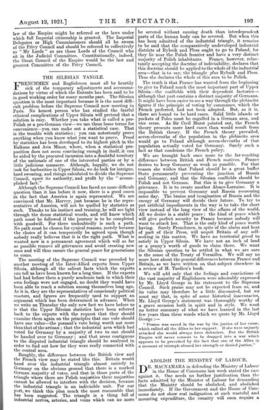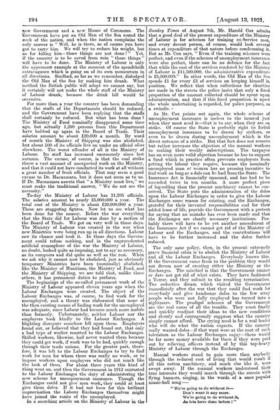ABOLISH THE MINISTRY OF LABOUR.
DR. MACNAMARA in defending the Ministry of Labour in the House of Commons last week stated the case against it. One needs no further justification than the facts admitted by the Minister of Labour for demanding that the Ministry should be abolished, and abolished immediately. If the Government and the House of Com- mons do not show real indignation at such wasteful and mounting expenditure, the country will soon require a new Government and a new House of Commons. The fu' overnsnent have put an Old Man of the Sea round the neck of the nation, and when the nation complains the only answer is " Well, he is there, so of course you have got to carry him. We will try to reduce his weight, but as for killing him—these things are not done ! " Yet, if the country is to be saved from ruin " these things " will have to be done. The Ministry of Labour is only the uppermost example at the moment of the spendthrift extravagance which is going on of its own momentum in all directions. Sindbad, so far as we remember, dislodged the Old Man of the Sea by making him drunk. What method the British public will adopt we cannot say, but it certainly will not make the whole staff of the Ministry of Labour drunk, because the drink bill would be esscessive.
For more than a year the country has been demanding that the staffs of the Departments should be reduced, and the Government have been replying that the staffs shall certainly be reduced. But what has been done The Ministry of Food nominally disappeared some time ago, but actually 1,200 persons from this Department have bobbed up again in the Board of Trade. Their salaries amount to about £20,000 a month. By word of mouth the Ministry of Shipping was also abolished, but about 500 of its officials live on under an official alias elsewhere. The .worst offender of all is the Ministry of Labour. Its staff has increased enormously since last autumn. The excuse, of course, is that the coal strike threw a vast amount of unexpected work on the Ministry, and that it could not have conducted its work at all without a great number of fresh officials. That may seem a good excuse to Dr. Macnamara, but it does not seem so to us. If Dr. Macnamara asserts that " a Ministry must live," we must make the traditional answer, " We do not see the necessity."
To-day the Ministry of Labour has 31,395 officials. The salaries amount to nearly £5,000,000 a year. The total cost of the Ministry is about £20,000,000 a year. These are staggering figures. Now let us see what has been done for the money. Before the war everything that the State did for Labour was done by a section of the Board of Trade. We got on very well in those days. The Ministry of Labour was created in the war when new Ministries were being run up in all directions. Labour saw its chance and took it. In those days the Govern- ment could refuse nothing, and in the unprecedented artificial atmosphere of the war the Ministry of Labour, no doubt, looked quite as imposing, not to say as necessary, as its compeers and did quite as well as the rest. When we ask why it cannot now be abolished, just as obviously temporary Ministries have been (nominally) abolished, like the Ministry of Munitions, the Ministry of Food, and the Ministry of Shipping, we are told that, unlike those others, it has permanent duties to perform. The beginnings of the so-called permanent work of the Ministry of Labour appeared eleven years ago when the Labour Exchanges were created. The object of the Labour Exchanges was, of course, to find work for the unemployed, and a theory was elaborated that none of the then existing means of finding work for the unemployed was adequate, since Labour had become much more mobile than formerly. Unfortunately, neither Labour nor the employers took kindly to the Labour Exchanges. A blighting disrepute somehow fell upon them. Employers found out, or believed that they had found out, that only a bad type of worker resorted to the Labour Exchanges. Skilled workers, likewise, had never wanted them because they could get work, if work was to be had, quickly enough through their trade unions. For the greater part, there- fore, it was left to the Labour Exchanges to try to find work for men for whom there was really no work, or to impose workers upon employers who did not much like the look of them. For about three years this kind of thing went on, and then the Government in 1912 entrusted to the Labour Exchanges the duty of administering the new scheme for unemployment insurance. Though the Exchanges could not give men work, they could at least give them doles. If it had not been for this brilliant improvisation the Labour Exchanges themselves might have joined the ranks of the unemployed. In a searching _article on the Ministry of Labour in the Sunday Times of August 7th, Mr. Harold Cox admits that a good deal of the present expenditure of the Ministry of Labour is for schemes for training ex-Service men, and every decent person, of course, would look several times at expenditure of that nature before condemning it. But as Mr. Cox says, " Even if the training schemes were perfect, and even if the schemes of unemployment insurance were also perfect, there can be no defence for the fact that while the cost of the services rendered by the Ministry of Labour is £14,500,000, the administrative expenditure is 15,500,000." In other words, the Old Man of the Sea spends £1 for every £3 of services on keeping himself in position. We reflect that when collections for charities are made in the streets the police insist that only a fixed proportion of the amount collected should be spent upon administration, and that if this fixed proportion is upset the whole undertaking is regarded, for police purposes, as a swindle. • As Mr. Cox points out again, the whole scheme of unemployment insurance is useless to the insured just when they most need it—that is to say, when they are on strike. Of course the State is perfectly right to forbid unemployment insurance to be drawn by strikers, or even to be drawn during unemployment which is the direct outcome of a strike. But that fact does not remove but rather increases the objection of the manual workers to making their weekly subscriptions. The taxpayer has an even more valid objection because he has to support a fund which in practice often prevents employers from getting the labour they require, because the nominally unemployed man or woman has no pressing incentive to find work so long as a dole can bs had from the State. The Insurance Act is financially unsound, and has had to be amended twice in ten months. A more perfect piece of log-rolling than the present machinery cannot be con- ceived. The State puts the administration of the doles upon the Labour Exchanges in order to give the Labour Exchanges some reason for existing, and the Exchanges, grateful for their invented responsibilities and for their added lease of life, provide the Government with a pretext for saying that no mistake has ever been made and that the Exchanges are clearly necessary institutions. Pro- bably there will have to be yet another amendment of the Insurance Act if we cannot get rid of the Ministry of Labour and the Exchanges, and the contributions will have to be further increased and the doles further reduced.
The only sane policy, then, in the present extremely grave financial crisis is to abolish the Ministry of Labour and all the Labour Exchanges. Everybody knows this. If the Government came fresh to the problem they would not dream now of creating either the Ministry or the Exchanges. The mischief is that the Government cannot or dare not get rid of what exists. They have fashioned a Terror, and they submit to the resulting terrorization. The seductive dream which visited the Government immediately after the war that they could find work for everybody and give handsome doles to the few stray people who were not fully employed has turned into a nightmare. The prodigal schemes of the Government are the real cause of all the trouble. They must finally and quickly readjust their ideas to the new conditions and sternly and courageously suppress what the country simply cannot afford. The crying need is for a real leader who will do what the nation expects. If the country really wanted doles—if that want were at the root of such toleration as the Labour Exchanges enjoy—there would be far more money available for them if they were paid out by relieving officers instead of by this top-heavy Ministry of Labour through the Exchanges.
Manual workers stand to gain more than anybody through the reduced cost of living that would result if all this rotten machinery, and much else like it, were swept away. If the manual workers understood that true interests they would march through the streets with flying banners, singing, in the words of a once popular music-hall song - " We're going to do- without it—. Don't want it any more. We're going to do without it, As iota have done before I



































 Previous page
Previous page